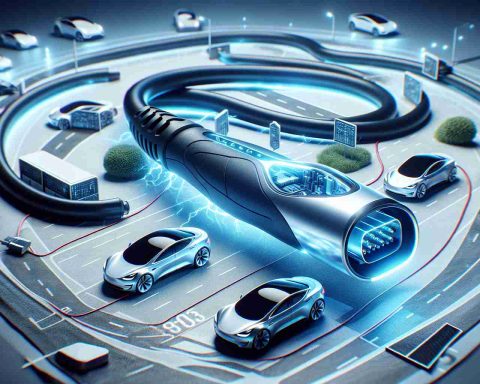Heartland Community College Launches Innovative EV Technician Program
Exciting developments are underway at Heartland Community College in Normal, as the college introduces a brand-new certificate program aimed at training future electric vehicle (EV) charging technicians. This initiative equips students with the essential skills needed to install and repair EV charging stations for both residential and commercial use.
Recently approved by the board of trustees, the program takes just a semester, requiring seven credit hours of focused study. Adam Campbell, the Dean of Career and Technical Education, emphasized the growing importance of this technology, noting its expanding presence in everyday life. Students have the option to pursue this certification independently or as part of the broader Energy Systems Technology certificate.
Rivian Automotive, a key player in the electric vehicle market, is collaborating with Illinois community colleges, including Heartland, to foster interest in careers related to EVs. The trend indicates a rising demand for EV chargers in new housing developments as the technology becomes increasingly widespread.
Graduates of the program will be well-prepared for entry-level roles within utility companies, manufacturing settings, or as independent contractors, even if they choose not to work directly in the EV sector. Faculty members highlight the abundance of opportunities available today compared to previous decades, expressing excitement about the promising futures for their students in the evolving electrical landscape.
The Electric Future: Implications of Training for EV Technicians
As the globe shifts increasingly towards sustainable energy, the establishment of programs like the one at Heartland Community College carries profound societal implications. The push for electric vehicles (EVs) is not merely about transportation; it represents a transformation of the entire automotive ecosystem. By training technicians in EV infrastructure, colleges are creating a skilled workforce poised to meet the demands of a burgeoning industry that is projected to generate millions of jobs worldwide.
This transition has a cultural impact, altering consumer behaviors and expectations. As EV ownership rises, societal norms surrounding vehicle ownership will likely evolve, focusing more on sustainability and energy efficiency. This shift primes consumers to embrace a future where the norm is not just electric vehicles but also the renewable energy sources powering them.
From an economic standpoint, the demand for EV charging stations signals a new era of infrastructure investment. Governments and private sectors are increasingly channeling funds to develop necessary support systems, which could lead to an economic multiplier effect—stimulating local economies while also encouraging further innovation in green technologies.
Furthermore, the environmental implications of this movement towards EVs and the infrastructure supporting them are significant. Transitioning away from fossil fuels aims to mitigate climate change impacts, reducing urban air pollution and associated health risks. As more individuals adopt EV technologies, cities might witness a decline in greenhouse gas emissions, potentially reshaping urban landscapes and public health indicators for generations.
Looking ahead, the long-term significance of training programs like that at Heartland cannot be overstated. As the automotive industry continues to innovate, the skills required will evolve, necessitating ongoing education and adaptation. This will create an ever-evolving job market optimized for sustainability, making these programs critical not just for workers but for the society at large as it navigates the complexities of eco-friendly advancements.
Driving the Future: Heartland Community College’s EV Technician Program Takes Off
Overview of the Innovative EV Technician Program
Heartland Community College in Normal is pioneering a transformative certificate program designed to prepare students for careers as electric vehicle (EV) charging technicians. With the rapid growth of electric vehicles, this initiative addresses the critical need for skilled technicians who can install and maintain charging stations in residential and commercial settings.
Program Details
The newly launched program is structured to be completed within a single semester, demanding seven credit hours of concentrated study. Students can choose to pursue this certificate as a standalone option or as part of the more extensive Energy Systems Technology certificate, thereby offering flexibility in education paths.
Industry Collaboration and Demand Trends
Rivian Automotive, a major player in the electric vehicle industry, is partnering with community colleges across Illinois, including Heartland, to stimulate interest in EV-related careers. The emphasis on collaboration between educational institutions and industry leaders highlights the increasing demand for skilled professionals in the EV market. As EV adoption expands, particularly in new housing developments, the call for qualified technicians is expected to grow.
Career Opportunities for Graduates
Upon completion of the program, graduates will find themselves well-equipped for various entry-level positions. Potential career routes include:
– Utility Companies: Providing essential services related to EV infrastructure.
– Manufacturing Settings: Helping to produce and maintain EV components.
– Independent Contracting: Offering services to install and repair EV charging stations independently.
The faculty at Heartland Community College express optimism about the job market for their students, noting a stark contrast in opportunities compared to previous decades.
Pros and Cons of the Program
Pros:
– Short Duration: The program can be completed in one semester, perfect for fast-track career entry.
– Industry-Relevant Skills: Curriculum focuses on current technologies and practices in the EV industry.
– Flexible Learning Options: Students can tailor their studies to fit their career plans.
Cons:
– Limited Scope: As a certificate program, it may not cover all advanced aspects of electrical systems.
– Varied Market Demand: Regional demand for EV technicians may fluctuate depending on local infrastructure and adoption rates.
Features of the Program
– Hands-On Training: Students engage in practical training, preparing them for real-world applications.
– Industry Partnerships: Connections with companies like Rivian enhance learning and job placement opportunities.
– Comprehensive Curriculum: Covers both residential and commercial EV charging systems.
Insights on the EV Market
As the global push for sustainability accelerates, EV technology is rapidly evolving. Experts predict strong job growth in the field of electric vehicles, particularly for roles like EV charging station technicians. The National Renewable Energy Laboratory (NREL) anticipates that by 2030, the number of charging stations will need to increase significantly to keep pace with EV sales.
Conclusion
Heartland Community College’s EV Technician Program represents a forward-thinking approach to vocational education, paving the way for students to seize emerging opportunities in the electric vehicle market. With industry partnerships and a curriculum tailored to meet current trends, graduates are likely to walk into a job market full of potential.
For further information on this exciting program, explore more at Heartland Community College.


















